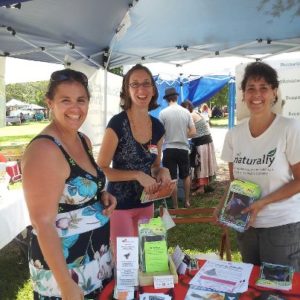Finding redemption in your wallet
By Nancy B. Loughlin
Published in News Press on January 8, 2013. Posted with permission.
In a Volkswagen commercial, a blue Beetle emerged from the mist: “If you sold your soul in the 80s, here’s your chance to buy it back.”
The 80s were linked with “Greed is good” conspicuous consumption, yet the iconic hippie-mobile, The VW Bug, was synonymous with Earth-friendly cosmic consciousness. Is buying a Beetle delivering more than transportation? Is the metaphorical Beetle a redemption vehicle?
This is branding at its finest. You’re not buying a car; you’re purchasing a lifestyle or image. The same goes for purses, jeans, phones, laptops, and coffee. But, a car is just a car. A purse is just a purse. A cup of coffee is just a cup of coffee.
Or are product choices more significant? Can we change ourselves and, by extension, our world through what we buy?
The answer is yes. And, no.
“Our buying habits mean everything, absolutely,” said Lynda Mastronardo of Cape Coral, owner of SWFL Naturally. “Every dollar we spend should be consciously thought out.”
For Mastronardo, buying locally is key.
In January, SWFLNaturally.com uploaded the latest directory of local green and sustainable businesses. Mastronardo started this local directory in 2009 by thinking globally while acting locally. While this directory is published twice a year in January and July, both in print and online, Mastronardo spends the rest of the year promoting those businesses.
In order to be featured in SWFLNaturally.com, each business is vetted by Mastronardo herself to ensure all components of the green equation are represented, including fair wages for employees and respect for Mother Earth. Big Box stores need not apply.
In our quest for buying virtue, there are other reasons to support LocalRama over United States of Generica. Numerous studies have shown that local businesses return more of their income dollars to the local economy than big retailers, can burn less fossil fuel than chain outlets, and donate more charity dollars for local causes.
Personal consumption does impact Earth. Get an idea of your carbon footprint, the tons of greenhouse gases emitted due to your fossil fuel consumption. There are many calculators online, but I used www.carbonfootprint.com. In order to make a dent in global climate change, the site estimates that humans should average two metric tons of emissions in a year. In full disclosure, my personal footprint is roughly 9.35 metric tons. I’ll be working on that.
Next, find out how many slaves worked to create your purchases with www.slaveryfootprint.org. Global estimates for modern slavery and human trafficking reach as high as 27 million human beings. Take the survey. My score was 33. I’ll really be working on that.
So what must we do? Buying locally, sustainable and organic can help, and I’m all for it. But, I’m also going to meditate on The No.
Buying our way out of complicity is just as grubby as buying into it. Where attention goes, energy flows. The more we focus on our buying habits as a way to heal the planet, the more we confirm that consumption is the dominant glue of humanity. That paradigm frightens me.
Instead of questioning why we’re buying, Madison Avenue and celebrity Eco-Stars are shifting the question to what we’re buying. We’re still buying in enormous quantities, trapping ourselves in the work/spend/accumulate cycle, and, despite our best intentions, stomping heavy carbon footprints and enslaving people, including ourselves.
I’ll be meditating on The No the next time I open my wallet.

